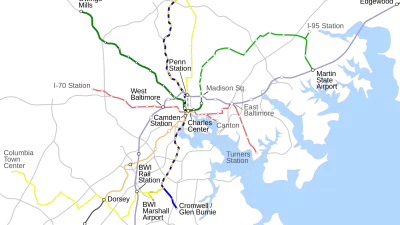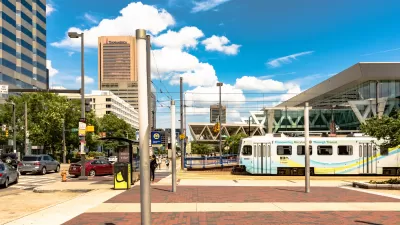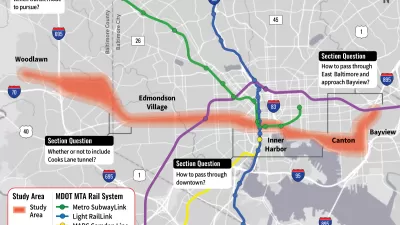A complaint filed with the U.S. Department of Transportation alleges that Maryland Gov. Hogan's decision to cancel the long-planned Red Line rail project violates the Civil Rights Act.
The decision by Maryland Governor Larry Hogan to cancel the Red Line rail project has had continuing blowback, according to an article by Emily Badger, and the situation exemplifies a common inequity in transportation investment around the country.
A coalition of civil rights groups filed a complaint earlier this week with the federal Department of Transportation that the decision violated the Civil Rights Act. "By nixing the transit project — particularly in favor of rural and suburban highway funding — the state will disproportionately harm African Americans," explains Badger of the complaint.
The article includes quotes and background from Sherrilyn Ifill, president and director-counsel for the NAACP Legal Defense and Education Fund, which led the complaint, to explain how the complaint connects the issues of transportation and civil rights. From the complaint itself: "the cancellation of the Red Line Project, rather than being a cost-saving measure, was simply a naked transfer of resources from the project corridor’s primarily African-American population to other rural and suburban parts of the state…"
Ifill also suggests that transportation contributed directly to the unrest that followed the death of Freddie Gray while in the custody of Baltimore police. "As much attention as we give to the trial of the officers who were charged in the killing of Freddie Gray...we should give to a decision that implicates 10,000 construction jobs and billions of infrastructure investment in Baltimore that were eliminated in a single day, by a single decision, made by a single person."
FULL STORY: The next civil rights issue of our time

Trump Administration Could Effectively End Housing Voucher Program
Federal officials are eyeing major cuts to the Section 8 program that helps millions of low-income households pay rent.

Planetizen Federal Action Tracker
A weekly monitor of how Trump’s orders and actions are impacting planners and planning in America.

Ken Jennings Launches Transit Web Series
The Jeopardy champ wants you to ride public transit.

Rebuilding Smarter: How LA County Is Guiding Fire-Ravaged Communities Toward Resilience
Los Angeles County is leading a coordinated effort to help fire-impacted communities rebuild with resilience by providing recovery resources, promoting fire-wise design, and aligning reconstruction with broader sustainability and climate goals.

When Borders Blur: Regional Collaboration in Action
As regional challenges outgrow city boundaries, “When Borders Blur” explores how cross-jurisdictional collaboration can drive smarter, more resilient urban planning, sharing real-world lessons from thriving partnerships across North America.

Philadelphia Is Expanding its Network of Roundabouts
Roundabouts are widely shown to decrease traffic speed, reduce congestion, and improve efficiency.
Urban Design for Planners 1: Software Tools
This six-course series explores essential urban design concepts using open source software and equips planners with the tools they need to participate fully in the urban design process.
Planning for Universal Design
Learn the tools for implementing Universal Design in planning regulations.
Ada County Highway District
Clanton & Associates, Inc.
Jessamine County Fiscal Court
Institute for Housing and Urban Development Studies (IHS)
City of Grandview
Harvard GSD Executive Education
Toledo-Lucas County Plan Commissions
Salt Lake City
NYU Wagner Graduate School of Public Service





























